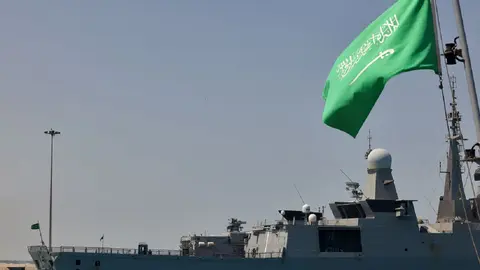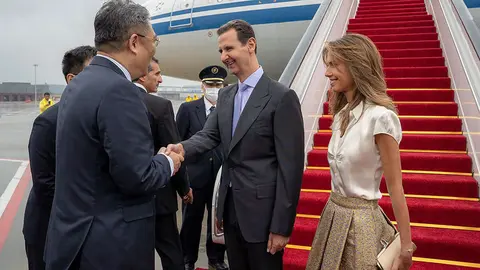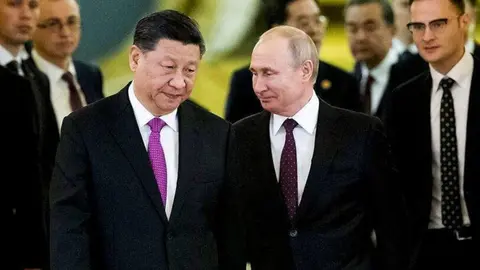Putin praises China's Belt and Road initiative ahead of visit with Xi Jinping

For the first time since the start of the war in Ukraine, Russian President Vladimir Putin has travelled to China in order to strengthen bilateral relations. During his visit, he is expected to meet with his Chinese counterpart, Xi Jinping - whom Putin calls a "dear friend" - as well as other high-ranking Chinese officials.
Putin will also participate as "chief guest" in the 3rd Belt and Road Forum in Beijing, an international cooperation event promoted by the Chinese leader to extend its influence globally along land and sea routes.
The Russian leader praised the Belt and Road Initiative, saying that although many people see it as an attempt by China to impose its control, it is a tool of "cooperation".
"The main advantage of the concept of cooperation proposed by China is that, within the framework of cooperation, nobody imposes anything on others," Putin told Chinese media ahead of his trip, as reported by Reuters. "This is the difference between President Xi Jinping's Belt and Road Initiative and other projects carried out by countries with colonialist overtones," he added.
Both Russia and China have advocated the establishment of a new international order that is not dominated by the US and its Western allies. Both countries have complicated relations with the West, and share different views on a number of international issues. On Ukraine, for example, China has not condemned the Russian invasion, but has continued to develop its ties with Moscow despite Western criticism.
In this regard, it is worth noting that since the beginning of the conflict, Russia has consolidated its energy ties with China, exporting around 2 million barrels of oil per day to China, according to Reuters figures. They have also intensified their economic and trade partnership, criticising international sanctions against Moscow.
Meanwhile Putin arrived in China to participate in the international forum "One Belt - One Road".
— Clash Report (@clashreport) October 17, 2023
He’ll meet with Xi Jinping, as well as the presidents of Vietnam, Mongolia and Laos, and the prime minister of Thailand. pic.twitter.com/WFGmVWOhil
Russia and China criticise Israel while the US defends its right to defend itself
Now, with the war between Israel and Hamas, China and Russia have expressed similar views, contrary to US and EU opinion. Both Beijing and Moscow have criticised Israel's actions in the Gaza Strip and called for a ceasefire, while the US defends Israel's right to defend itself against terrorism.
As reported by CNN, Moscow is expected to submit a resolution to the UN Security Council calling for a ceasefire without naming Hamas. On the other hand, the Russian representative to the UN has compared the Israeli air strikes against the Hamas-controlled Palestinian enclave to the brutal siege of Leningrad during World War II.
We just eliminated Ayman Nofal, a senior Hamas operative.
— Israel Defense Forces (@IDF) October 17, 2023
Nofal was the Commander of Hamas’ Central Brigade in Gaza and the former Head of Military Intelligence.
Nofal directed many attacks against Israeli civilians and besides being one of the most dominant figures in the… pic.twitter.com/t686L6gSuN
China, which has close ties with Iran, has expressed a similar view. Beijing has urged dialogue and condemned "all acts that harm civilians". In this regard, as AFP reports, China's special envoy for the Middle East, Zhai Jun, will visit the region this week to push for a ceasefire and peace talks. Beijing is increasingly seeking to expand its influence in the region through diplomacy after reaching an agreement between Iran and Saudi Arabia in March.
However, Chinese government statements have not condemned Hamas' terrorist acts, nor have they mentioned the Palestinian group. Chinese Foreign Minister Wang Yi has also stated that Israel's actions have "gone beyond the scope of self-defence".
In contrast, US President Joe Biden will visit Israel tomorrow, Wednesday, to reaffirm US support and solidarity with the country. Biden will reiterate that "Israel has the right, and even the duty, to defend itself against Hamas and other terrorists", as Secretary of State Antony Blinken has said.
On Wednesday, I'll travel to Israel to stand in solidarity in the face of Hamas's brutal terrorist attack.
— President Biden (@POTUS) October 17, 2023
I'll then travel to Jordan to address dire humanitarian needs, meet with leaders, and make clear that Hamas does not stand for Palestinians' right to self-determination.
Putin meets Viktor Orbán
Before meeting Xi, Putin held talks in Beijing with Hungarian President Viktor Orbán, one of the guests at the Chinese forum. Orbán has maintained strategic relations with Moscow despite the war and criticism from other European nations. Hungary gets most of its oil and gas from Russia, so it has not supported many anti-Moscow initiatives pushed by Brussels.
Regarding this meeting, Putin said that Russia is "satisfied" that "ties with many European countries are being maintained and developed", highlighting Hungary in this regard, as reported in the Russian media.
In Bejiing, China, #Russia’s president Putin held a bilateral meeting with #Hungary’s PM Orban.
— Alex Kokcharov (@AlexKokcharov) October 17, 2023
Orban is helping Putin to not feel isolated from the West.
pic.twitter.com/Y2TACvWMRR
The Russian president last visited China during the Beijing Winter Olympics in February 2022, shortly before the invasion of Ukraine began. During this visit, Beijing and Moscow announced a partnership 'without limits'. For his part, Xi travelled to Russia last March.
Putin has travelled little outside Russia after the International Criminal Court (ICC) issued an arrest warrant for him, accusing him of illegally deporting Ukrainian children to Russia. Prior to China, the Russian president visited Kyrgyzstan earlier this month. However, neither the former Soviet republic nor the Asian giant is a member of the ICC and therefore has no obligation to arrest Putin.
The 123 member states of the war crimes body are obliged to arrest Putin if he enters their territory, as well as transfer him to The Hague for trial.











